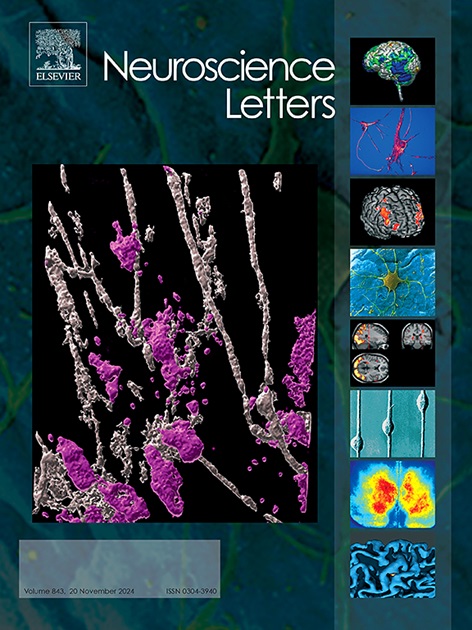Fatty acid-binding protein 7 gene deletion promotes decreases in brain cannabinoid type 1 receptor binding
IF 2.5
4区 医学
Q3 NEUROSCIENCES
引用次数: 0
Abstract
Fatty acid-binding protein 7 (FABP7) aids in the intracellular transport of endogenous cannabinoids and is involved in regulating the stress response system. This study examined the role of FABP7 in chronic stress exposure through the binding of CB1 receptors. Adult male FABP7+/+ and FABP7-/- mice were treated with the unpredictable chronic mild stress (UCMS) procedure. After 28 days of treatment, mice were euthanized, and CB1 was measured with in vitro autoradiography using [3H] SR141716A. FABP7-/- mice, irrespective of stress treatment, showed reduced [3H] SR141716A binding in the amygdala, secondary somatosensory cortex, and ventral caudate putamen compared with the FABP7+/+ mice. Additionally, FABP7-/- mice treated with UCMS exhibited a reduction in CB1 binding in the globus pallidus and ventral caudate putamen compared with UCMS-treated FABP7+/+ mice. Genetic deletion of FABP7 can decrease CB1 expression in various brain regions; however, the underlying mechanism remains unclear.
脂肪酸结合蛋白 7 基因缺失会导致大脑大麻素 1 型受体结合力下降。
脂肪酸结合蛋白 7(FABP7)有助于内源性大麻素的细胞内转运,并参与调节应激反应系统。本研究考察了 FABP7 通过结合 CB1 受体在慢性应激暴露中的作用。成年雄性 FABP7+/+ 和 FABP7-/- 小鼠接受了不可预测的慢性温和应激(UCMS)程序处理。治疗 28 天后,小鼠安乐死,并使用 [3H] SR141716A 通过体外自显影法测量 CB1。与 FABP7+/+ 小鼠相比,FABP7-/- 小鼠在杏仁核、次级躯体感觉皮层和腹侧尾状核丘脑中的 [3H] SR141716A 结合减少,与应激处理无关。此外,与经 UCMS 处理的 FABP7+/+ 小鼠相比,经 UCMS 处理的 FABP7-/- 小鼠在球状苍白球和腹侧尾状丘脑中的 CB1 结合减少。基因缺失 FABP7 可降低 CB1 在不同脑区的表达,但其潜在机制仍不清楚。
本文章由计算机程序翻译,如有差异,请以英文原文为准。
求助全文
约1分钟内获得全文
求助全文
来源期刊

Neuroscience Letters
医学-神经科学
CiteScore
5.20
自引率
0.00%
发文量
408
审稿时长
50 days
期刊介绍:
Neuroscience Letters is devoted to the rapid publication of short, high-quality papers of interest to the broad community of neuroscientists. Only papers which will make a significant addition to the literature in the field will be published. Papers in all areas of neuroscience - molecular, cellular, developmental, systems, behavioral and cognitive, as well as computational - will be considered for publication. Submission of laboratory investigations that shed light on disease mechanisms is encouraged. Special Issues, edited by Guest Editors to cover new and rapidly-moving areas, will include invited mini-reviews. Occasional mini-reviews in especially timely areas will be considered for publication, without invitation, outside of Special Issues; these un-solicited mini-reviews can be submitted without invitation but must be of very high quality. Clinical studies will also be published if they provide new information about organization or actions of the nervous system, or provide new insights into the neurobiology of disease. NSL does not publish case reports.
 求助内容:
求助内容: 应助结果提醒方式:
应助结果提醒方式:


